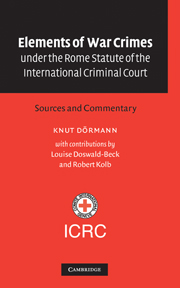 Elements of War Crimes under the Rome Statute of the International Criminal Court
Elements of War Crimes under the Rome Statute of the International Criminal Court Book contents
- Frontmatter
- Contents
- Foreword by Dr Jakob Kellenberger, President of the International Committee of the Red Cross
- Foreword by Ambassador Philippe Kirsch, QC
- Table of cases by alphabetical order
- Table of cases by jurisdiction
- Table of treaties and other international instruments
- List of abbreviations
- 1 Introduction
- 2 Legal value of the elements of crimes
- 3 General Introduction adopted by the PrepCom
- 4 Introduction to elements of war crimes listed in Article 8 of the Rome Statute
- 5 Article 8(2)(a) ICC Statute – Grave breaches of the 1949 Geneva Conventions
- 6 Article 8(2)(b) ICC Statute – Other serious violations of the laws and customs applicable in international armed conflict
- 7 Article 8(2)(c) ICC Statute – Violations of common Article 3 of the 1949 Geneva Conventions
- 8 Article 8(2)(e) ICC Statute – Other serious violations of the laws and customs applicable in armed conflicts not of an international character
- Appendix: Request from the Governments of Belgium, Finland, Hungary, Mexico, the Republic of Korea and South Africa and the Permanent Observer Mission of Switzerland to the United Nations regarding the text prepared by the International Committee of the Red Cross on the mental element in the common law and civil law systems and on the concepts of mistake of fact and mistake of law in national and international law
- Bibliography
- Index
Foreword by Dr Jakob Kellenberger, President of the International Committee of the Red Cross
Published online by Cambridge University Press: 08 August 2009
- Frontmatter
- Contents
- Foreword by Dr Jakob Kellenberger, President of the International Committee of the Red Cross
- Foreword by Ambassador Philippe Kirsch, QC
- Table of cases by alphabetical order
- Table of cases by jurisdiction
- Table of treaties and other international instruments
- List of abbreviations
- 1 Introduction
- 2 Legal value of the elements of crimes
- 3 General Introduction adopted by the PrepCom
- 4 Introduction to elements of war crimes listed in Article 8 of the Rome Statute
- 5 Article 8(2)(a) ICC Statute – Grave breaches of the 1949 Geneva Conventions
- 6 Article 8(2)(b) ICC Statute – Other serious violations of the laws and customs applicable in international armed conflict
- 7 Article 8(2)(c) ICC Statute – Violations of common Article 3 of the 1949 Geneva Conventions
- 8 Article 8(2)(e) ICC Statute – Other serious violations of the laws and customs applicable in armed conflicts not of an international character
- Appendix: Request from the Governments of Belgium, Finland, Hungary, Mexico, the Republic of Korea and South Africa and the Permanent Observer Mission of Switzerland to the United Nations regarding the text prepared by the International Committee of the Red Cross on the mental element in the common law and civil law systems and on the concepts of mistake of fact and mistake of law in national and international law
- Bibliography
- Index
Summary
Under the regime of the 1949 Geneva Conventions and the 1977 Additional Protocols thereto, States undertook to enact any legislation necessary to provide effective penal sanctions for persons committing, or ordering to be committed, grave breaches of the Geneva Conventions and Additional Protocols as defined in these instruments of international humanitarian law. More specifically, they incurred the obligation to search for persons alleged to have committed, or to have ordered to be committed, such grave breaches, and to bring such persons, regardless of their nationality, before their own courts. They may also, if they prefer, hand such persons over for trial to another High Contracting Party. In addition, States agreed to take measures necessary for the suppression of all acts contrary to the provisions of the Conventions and Protocols other than grave breaches.
The decision to lay down specific rules on the penal repression of serious violations of international humanitarian law was founded on the conviction that a law which is not backed up by sanctions quickly loses its credibility. Those who drafted the Geneva Conventions and Additional Protocols felt that penal repression could best be ensured on the national level, leaving the primary responsibility of defining and setting up an appropriate system to national authorities. Nevertheless, ever since the founding of the United Nations, and especially in view of the trials that took place after the Second World War, there has been an ongoing debate on the need to create a permanent international criminal court competent to try international crimes, including serious violations of international humanitarian law.
- Type
- Chapter
- Information
- Elements of War Crimes under the Rome Statute of the International Criminal CourtSources and Commentary, pp. ix - xiiPublisher: Cambridge University PressPrint publication year: 2003
